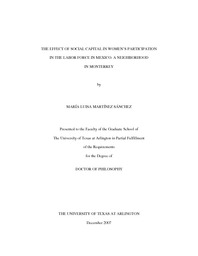
ATTENTION: The works hosted here are being migrated to a new repository that will consolidate resources, improve discoverability, and better show UTA's research impact on the global community. We will update authors as the migration progresses. Please see MavMatrix for more information.
Show simple item record
| dc.contributor.author | Martinez Sanchez, Maria Luisa | en_US |
| dc.date.accessioned | 2008-04-22T02:41:30Z | |
| dc.date.available | 2008-04-22T02:41:30Z | |
| dc.date.issued | 2008-04-22T02:41:30Z | |
| dc.date.submitted | December 2007 | en_US |
| dc.identifier.other | DISS-1981 | en_US |
| dc.identifier.uri | http://hdl.handle.net/10106/772 | |
| dc.description.abstract | The purpose of this dissertation study was to explore associations between Women's Participation in the Labor Force (WPLF), family organization (type of family, family size, domestic work and decision-making), personal attributes (years of schooling and labor experience), and social capital, an original approach of this study to understand WPLF. Social capital theoretical approach has been tested mainly in developed countries, in this study a qualitative component to explore cultural factors has been added. In the quantitative component, the study is a cross-sectional, with survey of 190 women (103 working women, 87 non-working women) between the ages of 18 and 64 years) in the community Lomas de Anáhuac, located in Monterrey, México. To address the study's hypotheses, factor analysis, bivariate analysis and binary logistic regression analysis were performed with the data. In the multivariate model, four variables are significant predictors in the likelihood of WPLF: domestic labor, decision-making, network size and network quality. To identify cultural impression the qualitative component is exploratory with 20 interviews of women. Findings show that culture factors are involved in women's ideas about WPLF (e.g., work significance, advantages and disadvantages to work outside their households, perceptions of both working and non-working women, and intergenerational changes). The social capital approach defined here as potential social capital -social networks- and effective social capital -obtained benefits- is innovative. The findings related to potential social capital are a step ahead in social capital theoretical discussion, and could be the basis for more effective social policies encouraging women's participation in the labor force. | en_US |
| dc.description.sponsorship | Pillai, Vijayan K. | en_US |
| dc.language.iso | EN | en_US |
| dc.publisher | Social Work | en_US |
| dc.title | The Effect Of Social Capital In Women's Participation In The Labor Force In Mexico: A Neighborhood In Monterrey | en_US |
| dc.type | Ph.D. | en_US |
| dc.contributor.committeeChair | Pillai, Vijayan K. | en_US |
| dc.degree.department | Social Work | en_US |
| dc.degree.discipline | Social Work | en_US |
| dc.degree.grantor | University of Texas at Arlington | en_US |
| dc.degree.level | doctoral | en_US |
| dc.degree.name | Ph.D. | en_US |
| dc.identifier.externalLink | https://www.uta.edu/ra/real/editprofile.php?onlyview=1&pid=333 | |
| dc.identifier.externalLinkDescription | Link to Research Profiles | |
Files in this item
- Name:
- umi-uta-1981.pdf
- Size:
- 747.7Kb
- Format:
- PDF
This item appears in the following Collection(s)
Show simple item record


